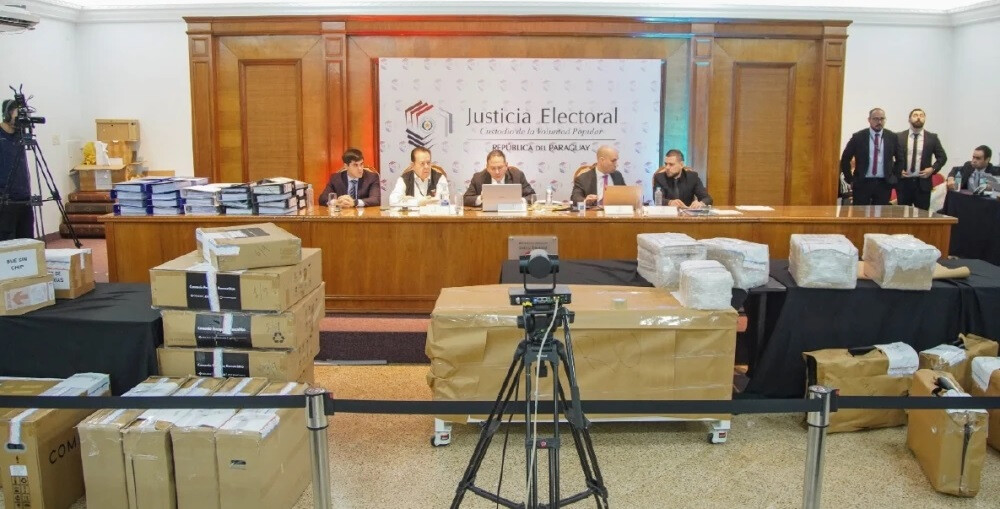
Asunción, Paraguay – Controversy is intensifying in Paraguay as the Superior Court of Electoral Justice (TSJE) announced that the selected vendor for 28,000 voting machines will also be responsible for the cybersecurity of these devices. This decision has sparked criticism, with opponents arguing it effectively delegates core security of the national electoral system to a private company.
The TSJE recently responded to inquiries regarding the voting machines raised by opposition senators via its official X (formerly Twitter) account. In its reply, the TSJE stated, "For cybersecurity issues with a risk of hacking, the awarded company must have technically skilled personnel in that field." It added that these personnel would be "responsible for jointly designing, implementing, and evaluating, with the Electoral Court, the security measures necessary to ensure the integrity, confidentiality, and availability of the electoral system."
The senators who requested this information include Lider Amarilla, Celeste Amarilla, Ignacio Iramain Chilavert, Yolanda Paredes, Rafael Filizzola, Ever Villalba, and Ruben Velázquez.
"Privatization of Cybersecurity is an Act of Abandoning Sovereignty" – Criticism Mounts
Joaquín Morínigo Fiorio, a new technology analyst, strongly criticized the TSJE's decision, calling it "essentially the privatization of cybersecurity." He questioned, "Why privatize it? Is it because the TSJE lacks its own capabilities? This is a method that proposes no standards, a complete abandonment of sovereignty."
Morínigo emphasized, "This very answer is what the technical community is pointing out. Issues related to national security, meaning the electoral system that legitimizes future power, cannot be left to the discretion of a private company, whether domestic or foreign." He warned, "This claim that the vendor will be responsible for cybersecurity is precisely the starting point for all conspiracy theories about selling, distorting, or handing over the will of the people to third parties."
Morínigo further added that technical dependence on technologies that are incomprehensible, uncontrollable, or not fully auditable can undermine a nation's autonomy, increasing vulnerability to external manipulation. He asserted, "If the vendor is linked to political or economic interests, or foreign governments, there could be a risk of interference or manipulation."
"Avoiding International Standards is Playing Russian Roulette" – Warning Issued
Computer analyst Luis Benítez expressed concern over "the argument to avoid the use of international standards to not limit innovation." He explained, "In the field of cybersecurity, especially for highly sensitive systems used in elections, not all innovation is good; it must be backed by clear norms and internationally recognized best practices."
Benítez stressed, "Security standards exist for a reason. They help ensure that systems operate stably, transparently, and securely. They also allow different technical components to understand each other (interoperability) and to be reviewed and verified (traceability). These aspects are essential when the integrity of a democratic system is at stake."
According to the analyst, the decision not to apply these standards in the name of innovation is "like playing Russian roulette." He worried, "This opens the door to allowing customized systems that do not follow known rules and cannot be properly audited. That is, you cannot review how they work or ensure they meet minimum security requirements."
Massive Budget, 10-Year Lifespan – Transparency Demands Intensify
The TSJE is expected to purchase 28,000 voting machines in the coming weeks, a procurement estimated to cost approximately $92,820,334 USD (approximately 127 billion Korean Won). These machines are intended for use over the next decade.
This cybersecurity controversy raises fundamental questions about the appropriateness of fully entrusting the core infrastructure of the national electoral system, involving a massive budget, to a private company. As the cybersecurity of voting machines is a critical issue that could undermine the very foundation of democracy, calls for transparent and accountable measures are growing louder.
[Copyright (c) Global Economic Times. All Rights Reserved.]



























